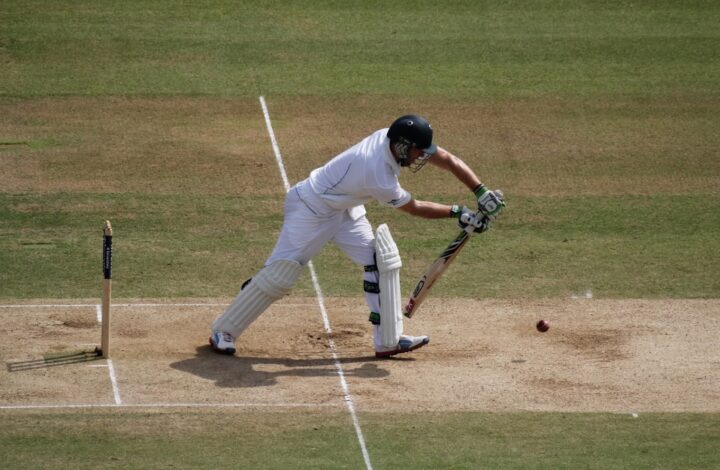Today new writer Dave Windram pays tribute to Dom Sibley, the man who embodies the hardworking rank and file of the England cricket team more than anyone. Enjoy.
It’s 4.01am in the UK and sleepy peepers are being prised open by the sharp glare of flickering images from Chennai. Ishant Sharma is bowling his third delivery of the game. Energised and with vigour. Thoughts of an early breakthrough propelling his legs. Dom Sibley faces up and calmly watches the ball through to the keeper. Strap in. Are you here for a good time or a long time? The answer should be both.
I have no idea of Dom Sibley’s political persuasion and frankly couldn’t care less. However, his batting is pure socialist. A clenched fist holding a red rose.
The general principle of socialism is putting aside the idea of personal gain in order to work towards furthering the common good. The advantages and disadvantages of socialism are not for debate here, but in cricketing terms an ideology based around forgoing personal gain for the common good feels undeniably beneficial.
Dom Sibley’s batting demonstrates this philosophy in abundance. Having a player at the top of the order who will bat time and soak up deliveries, all while foregoing the temptation to push his own score swiftly on, will generally put you in a prime spot to win a Test match – or certainly not lose. This is entirely aimed towards assisting your colleagues down the order and ultimately, the team’s position. Laying a red carpet for middle order batsmen whose skill is to ruthlessly punish tired ball and bowlers, while all the while recognising it’s these batsmen who will to make the headlines.
To borrow a Billy Bremner quote “side before self, every time”.
In the first innings at Chennai, Sibley set the foundation on which England’s Test winning total was built. Joe Root cashed in with the big runs, but it was Sibley who enabled it. Working in tandem with Rory Burns, he set about absorbing delivery after delivery from new ball magicians Bumrah and Sharma. If you are to stand any chance of winning in India this initial hurdle must be cleared. His scoring rate was impeccable. Just enough to keep clear of becoming bogged down but without seeking out trouble.
Despite two of his partners falling in quick succession, Sibley set about the defining partnership of the Test with Root, an eventual 200 runs off 383 balls. How many of these runs belong to Sibley doesn’t matter. What matters is that he was there. He was there watching the ball through to the keeper; he was there blocking and blocking and blocking; he was there occasionally clipping one off his legs. Very occasionally. But he was there.
Of the 383 balls in their partnership Root faced only four more. There was a point when both Sibley and Root were on 62, despite Root arriving in the middle 25 overs after Sibley. For many a batter the temptation to try and keep up with your partner’s scoring rate would play on the mind, nudging you into a loose shot. That’s not Sibley’s game. His objective was clear. Keep Root in the middle and get him beyond three figures.
As Sibley himself slowly crept his way into high double figures he let numerous tempting balls outside his off stump fly harmlessly past. The Indian plan to tempt him into a rash shot was a sound one. But Sibley bats for the greater good, not the glory.
There had been a similar scenario previously. Still finding his feet in Test cricket, Sibley was averaging in the teens as England sought a crucial victory to level the series in South Africa. A small lead going into the second innings meant a tough job was ahead, with South African bowlers sniffing the opportunity to go up dorme two. Sibley’s role in facilitating and supporting those around him was again vital. He scored 2 runs off the first 10 overs and left the scoring to others. Importantly, he was still there.
With declaration runs required, Sibley allowed the space for Ben Stoke to batter a swift 72. Despite a maiden hundred in sight, Sibley stuck to the plan. Batting sensibly to ensure that the quick scorers had the space to make rapid runs and smash South Africa out of the game. After over eight hours in the middle, he ended the innings with 133 scribbled in red ink. Ben Stokes won player of the match. But he knew who the real MVP was and passed the award to Sibley.

The abnormal makes people uncomfortable and Dom Sibley’s batting looks abnormal. That is just fact. A lot of critics can’t see past the stance, the heavy leg side scoring or awkward flurry of limbs. In no way does Sibley swish a high elbowed orthodox stick. But does it really matter? Ugly can still win. The crease occupation is rhythmic. Not in a traditional classicist way, more in a scratchy dishevelled way. Bat, leave, leave, bat, leave, bat, bat, leave. Almost as if he is tapping out some sort of message via morse code to his team mates.
You get the sense Sibley knows his limitations. In his short Test career he has shown exceptional aptitude for identifying areas to improve and demonstrating those improvements quickly. After observing the alpha specimens of Stokes and Buttler at close proximately, Sibley felt he was the wrong side of thicc, so shredded 12 kgs to compensate. I have no idea if that is a lot, but the eye test on Sibley’s return would suggest it is.
For the first three innings of his debut trip to the subcontinent Sibley batted like shit. He admitted as much to Niroshan Dickwella when cheekily asked if he was opening in India. Not that we needed confirmation. It was eye wateringly painful watching him scramble around the crease against Sri Lankan spin. But he clearly went to work. By the final innings, and with England threating a capitulation, he looked increasingly confident. A solid 50 was an encouraging sight for Ed Smith’s designer sunglassed eyes.
Understandably, England selectors have been hesitant to commit to Test openers. But, whisper it, the incumbents are starting to look like they have the spots nailed down. It’s feels like validation for players who pile up big runs in the County Championship being given the time to develop at Test level. Sorry Gary Ballance, your timing was five years too early. Sibley has certainly been the benefactor of Chris Silverwood’s reintroduction in valuing an opening bat with patience, who can underpin an innings.
Since Sibley’s debut in New Zealand, England have played five Test series and won four of them. Winning a Test series without a crease occupier like Sibley is exceptionally difficult. To win a series you need to put up big scores and that only becomes possible if you can face enough balls. However, once you have someone who has the patience to face those balls, letting delivery after delivery go by, you can turn Test match wins into Test series wins. It’s no coincidence that we are seeing the best red ball version of Jos Buttler now that Sibley is around. Buttler can finally play the role that he is intended for. A counter attacking innings at a strike rate that suits him and the team.
If Dom Sibley isn’t there Joe Root has to see off the new ball. If Dom Sibley isn’t there Ben Stokes can’t batter his way to a run a ball hundred. If Dom Sibley isn’t there Ollie Pope can’t ramp your speed merchant for six. If Dom Sibley isn’t there Jos Buttler has to be a 45 degree batter instead of a 360. Sibley is slowly becoming a unique cog in the England machine, which if removed, would send the machine spluttering to a halt. The last time England had an eye sore as an opening bat, he ended up with 12,000 plus Test runs, and was part of away wins in India and Australia. Just saying.
It’s 11.05am in the UK and half way through the working day. Joe Root has cramped up. Rory Burns and Dan Lawrence are long gone. Virat Kohli, Ravichandran Ashwin and Ishant Sharma are fed up. Their bodies sagging at the thought of more toil to come. They are back tomorrow for more. Dom Sibley stands at the far end of the pitch. He has been there from the 1st ball to the 537th ball. Some will claim a road. But six and a quarter hours on a hot, humid sticky road would have the most ardent of backpackers sticking up a thumb to the first car in sight.
Sibley’s concentration has barely wavered over those six and a quarter energy draining minutes. He is the grandmaster Yogi. He has gone through personal physical pain to further the common cause. But the 538th ball is his last. Trapped plumb LBW by an exhausted Bumrah, who can barely raise arms to celebrate. It’s been a long day.
As a sweat stoked Sibley trudges from the field, he passes Stokes and Buttler, both fresh faced and energetically clapping. They see the sacrifice. They see what Sibley has done. They can play their way tomorrow.
Solidarity, Dom. Bat on.
David Windram








All Warwickshire men know about Sibley’s red ball potential. He’s always had the temperament and when he first came on the scene he had the all round technique till ‘The King of Spain’ messed with it to make him more effective in white ball. The result being he developed a less than sideways on stance and worked everything to leg. He’s starting to correct this now and we see a few more off side shots. Good news for all concerned.
If that’s true, it makes me wonder why Warks have bothered with having a Director of Cricket as well as a head coach if the DoC is going to be doing coaching work. I would have thought that the kind of adjustment you describe is a matter for the head coach and/or the batting coach.
It’s ironic that Sibley can bat like he does because the BCCI saved five day Tests. Sibley’s own board supported by many of the others wanted to scrap a day but it was the BCCI that stopped them. It’s an issue that seems to have abated for now but expect them to try again.
I wonder how much of the media would have turned on Sibley if the bowlers hadn’t forced the win on the last day?
Not many, I suspect. The press reaction to his innings was pretty positive before the last day. Had we not won, Root would have picked up the flack for not declaring earlier, his decision based, I would guess, on the fact that he didn’t trust his spinners enough to bowl India out if he set them a target, hence his decision to bat them out of the game and make avoiding defeat his first priority. It was a tactic which he had seen Cook employ successfully on many occasions.